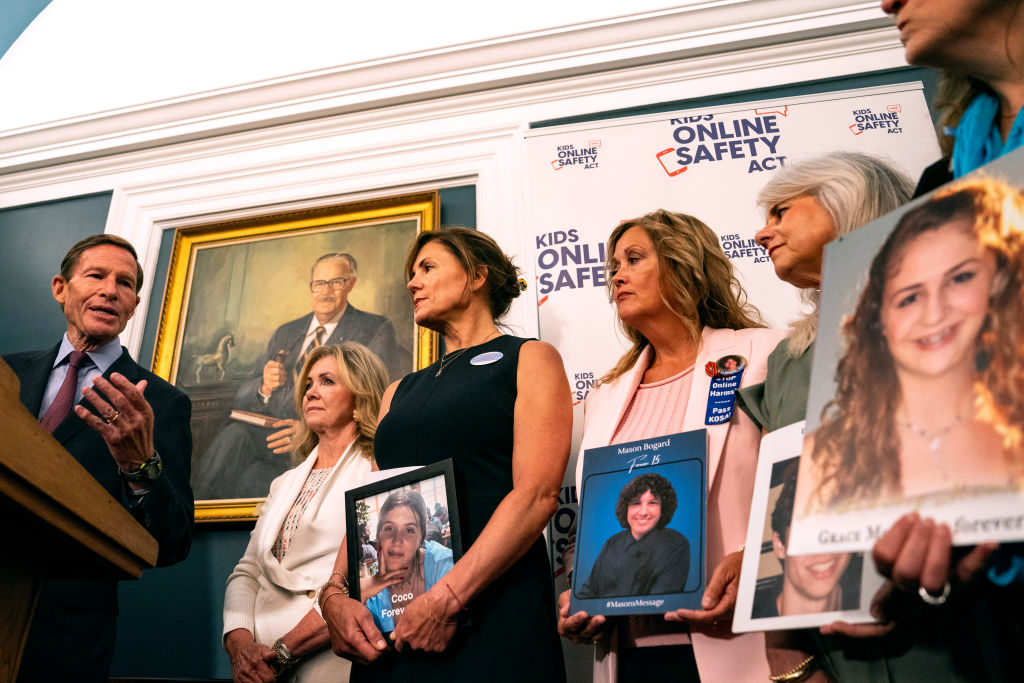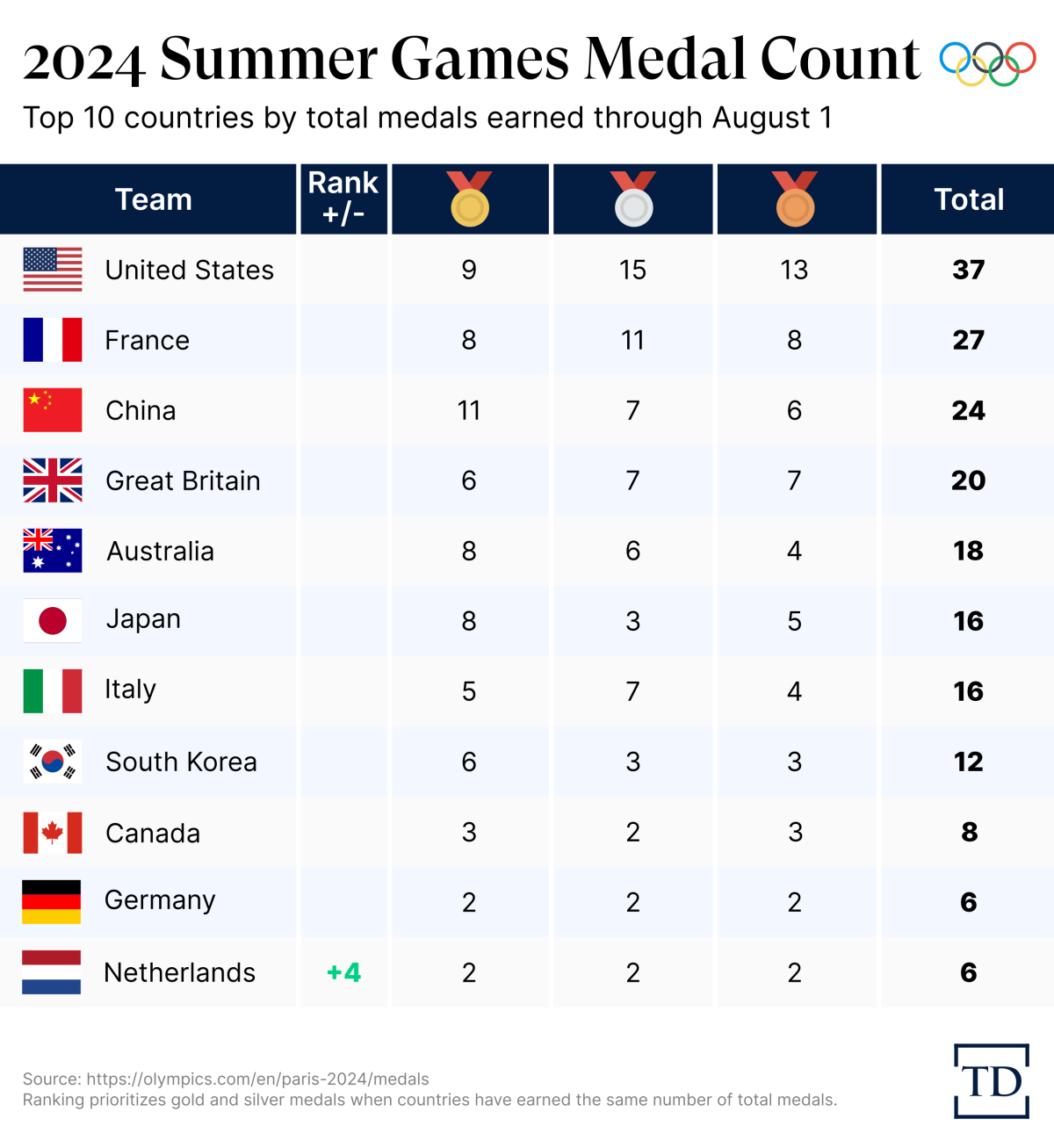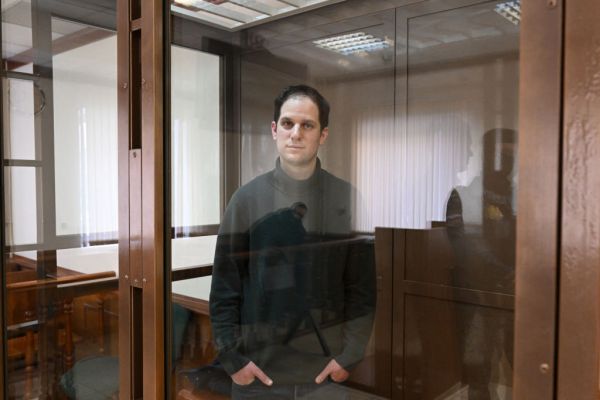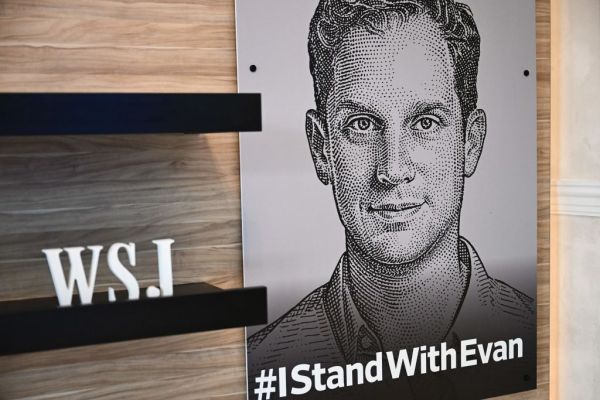Happy Friday! A statue of country music legend Johnny Cash is set to be unveiled in the U.S. Capitol in September, House leadership announced Thursday. The singer who once performed live at Folsom Prison will now watch over a rather different setting—though perhaps not that different.
Quick Hits: Today’s Top Stories
- The United States, Russia, and a handful of other countries completed the largest prisoner swap since the collapse of the Soviet Union on Thursday, freeing Wall Street Journal reporter Evan Gershkovich, former U.S. Marine Paul Whelan, Radio Free Europe/Radio Liberty journalist Alsu Kurmasheva, Washington Post columnist and Russian political dissident Vladimir Kara-Murza, and more than a dozen other Russian dissidents. In return, Russia received nine prisoners from four different countries, including Russian assassin Vadim Krasikov, who was convicted of “state-sponsored murder” and given a life imprisonment sentence for the 2019 killing of a Chechen war veteran in Berlin, Germany, on orders from Russian authorities.
- The U.S. on Thursday recognized Venezuelan opposition candidate Edmundo González as the winner of Sunday’s presidential election in the country, despite Venezuelan dictator Nicolás Maduro claiming victory. The opposition said there were significant irregularities in the vote and the count, and exit polls from a U.S. firm suggested González had won by a wide margin. “Given the overwhelming evidence, it is clear to the United States and, most importantly, to the Venezuelan people that Edmundo González Urrutia won the most votes in Venezuela’s July 28 presidential election,” U.S. Secretary of State Antony Blinken said Thursday. “We congratulate Edmundo González Urrutia on his successful campaign. Now is the time for the Venezuelan parties to begin discussions on a respectful, peaceful transition in accordance with Venezuelan electoral law and the wishes of the Venezuelan people.”
- South Korea on Thursday offered humanitarian aid and other relief resources to North Korea after heavy floods ripped through the nation’s northern region in recent days near its border with China. North Korea has yet to publicly address the gesture; it comes after months of tense relations between the two countries due, in part, to the countries’ exchange of balloons carrying trash and propaganda across their shared border.
- The New York Times reported on Thursday that Hamas’ top political leader, Ismail Haniyeh, was killed by a bomb hidden in the bedroom he was staying in at a guesthouse in Iran. The Times reported that about two months before Haniyeh’s visit to Tehran for the inauguration of the country’s new president, an electronic explosive device was reportedly smuggled into the large compound the Hamas leader was known to stay at and digitally detonated once he was confirmed to be in the room. Israel is likely behind the attack but has not publicly taken responsibility.
- The U.S. government-funded Famine Early Warning Systems Network and the Famine Review Committee declared on Thursday that a refugee camp located in western Sudan—known as the Zamzam camp, hosting some 500,000 displaced Sudanese refugees—has been experiencing famine for more than a month, meaning at least 1 in 5 people in the area are experiencing a severe lack of food “where starvation, death, and destitution are evident.” The organizations also noted that two other Sudanese refugee camps may also be experiencing famine, but there is a lack of conclusive data to verify.
- Thirty-five Senate Democrats introduced the “No Kings Act” legislation on Thursday, which aims to remove executive immunity for presidents and vice presidents who violate federal criminal law and would have Congress—not the Supreme Court—be the ultimate arbiter in questions regarding the potential criminality of executive branch officials. The legislation is part of President Joe Biden’s efforts to reform the Supreme Court and is intended to overturn the high court’s ruling on presidential immunity last month—a decision Senate Democrats said was “incorrectly declared.” Even if it passed the Senate, the legislation would be dead on arrival in the Republican-controlled House of Representatives.
- The Utah state Supreme Court on Thursday kept in place a temporary suspension of the state’s abortion restriction until a lawsuit challenging the law’s constitutionality is decided. The abortion restriction—which would ban abortions “at any stage” of pregnancy, except in instances of rape, incest, or to save the life of the mother—was initially passed in 2020, briefly implemented in 2022 following the reversal of Roe v. Wade, and suspended less than a month later when Planned Parenthood’s Association of Utah (PPAU) filed a lawsuit contending the law violates Utah’s state constitution. “PPAU had raised serious issues about the constitutionality of [the abortion law],” Utah Justice John Pearce wrote in his majority opinion. “The court did not abuse its discretion when it concluded that PPAU and its patients would be irreparably harmed without the injunction.”
‘Feat of Diplomacy’ Results in Massive Prisoner Exchange

Wall Street Journal reporter Evan Gershkovich spent his days in Moscow’s notorious Lefortovo Prison writing. “Maybe, finally, I am going to write something good,” he told his mother, Ella Milman, in the first letter she received from him in April 2023 after his arrest in late March of that year.
Russian authorities had grabbed him in Yekaterinburg, Russia, while he was on a reporting trip. They charged him with espionage—the first U.S. journalist to face such a charge in Russia since the end of the Cold War.
But he was no spy. He was a reporter. The Wall Street Journal—which, like the U.S. government, vehemently denied the espionage charges—reported yesterday that, in his free time before his arrest, Gershkovich worked and reworked the first paragraph of stories just to practice. He once said the phenomenon of Russia detaining Americans on trumped-up charges to exchange them for Russians was a “totally undercovered” story.
Almost 500 days ago, Gershkovich became the story. Today, he’s free—along with two other Americans: fellow journalist, Radio Liberty/Radio Free Europe correspondent Alsu Kurmasheva, arrested last year while visiting her ailing mother, and former U.S. Marine Paul Whelan, detained at a friend’s wedding in Russia in December 2018. The U.S. government officially determined that all three were “wrongfully detained.”
Thursday’s prisoner swap—which also included the release of 13 European nationals and Russian dissidents in exchange for (actual) Russian spies and a high-profile Russian assassin—was reportedly the result of months-long international negotiations that several times looked at risk of collapsing.
In the first picture of Gershkovich, Kurmasheva, and Whelan after their release, the trio stood smiling behind an American flag in Turkey, the site of the swap. Whelan—who’d been his own vocal advocate for the almost six years he’d spent in prison as other, higher-profile prisoners like basketball player Brittney Griner, made it home—looked withdrawn, almost in shock. Kurmasheva grinned. For Gershkovich, it was a different smile than the wry look he often wore at hearings in a Russian court during his 16-month confinement, standing in a glass cage in the courtroom.
Gershkovich’s trial, originally set to begin this month, was moved forward at the request of his team. In mid-July, in unusually quick proceedings that prompted speculation a trade may be in the offing, he was found guilty of espionage and sentenced to 16 years in prison. “The bigger the punishment the sentence is, the more grandiose the humanitarian gesture is of releasing him,” Mickey Bergman, hostage negotiator and CEO of Global Reach, told TMD’s Grayson Logue on The Skiff (🔒) in June, describing the case of Danny Fenster in Burma.
But Russian President Vladimir Putin didn’t release Gershkovich and the others out of the goodness of his heart. The deal relied on U.S. partners across Europe, who—in what President Joe Biden called a “feat of diplomacy”—had to be convinced to give up Russians who had broken their laws, had been convicted in legitimate trials, and were serving prison sentences in their respective countries. “I am grateful to our Allies who stood with us throughout tough, complex negotiations to achieve this outcome—including Germany, Poland, Slovenia, Norway, and Turkey,” Biden said Thursday. “This is a powerful example of why it’s vital to have friends in this world whom you can trust and depend upon. Our alliances make Americans safer.”
U.S. allies agreed to free deep-cover Russian spies in Slovenia, Norway, and Poland, several of whom had set up false identities, The Americans-style. The U.S., which had few Russian prisoners of value in custody, turned over three convicted cybercriminals and spies who’d stolen information from U.S. companies and illegally sold U.S. military hardware.
But they were small fish compared to the person Putin really wanted back in Russia: assassin Vadim Krasikov. The Russian president seemed to have a personal connection to Krasikov—an operative in the FSB, the Russian security service—that stretched back years. In 2019, Krasikov shot a Chechen separatist in the head in broad daylight in a park in Berlin, Germany, as families and children watched. He was sentenced to life in prison in Germany for the shockingly brazen attack, and Putin reportedly had privately pushed his own advisers for years to try to get Krasikov back to Russia.
Putin made it clear he’d sell the farm for Krasikov in a February interview with Tucker Carlson, of all people, who called on Putin to release Gershkovich. For the first time, Putin publicly set his terms: He needed “a person serving a sentence in an allied country of the U.S.”—clearly Krasikov.
Turning over the convicted assassin was reportedly a hard sell for many in the German establishment, including German Chancellor Olaf Scholz. Biden and Scholz’s personal relationship—Scholz has said he considers Biden a friend—seemed to play a significant role in the German leader’s ultimate decision to turn the killer over in the exchange.
But German officials also wanted to swap Krasikov for Russian dissident leader Alexei Navalny, whom Germany had sheltered after Russian agents poisoned him in an attempted assassination in 2020. He’d returned to Russia in 2021 after he was poisoned, facing certain arrest, and spent three years in a Russian prison.
In early February of this year, Scholz agreed to the swap. But then Navalny died in a Siberian penal colony on February 17, missing his shot at freedom perhaps by mere weeks. His death nearly derailed the deal.
Enter Ella Milman, Gershkovich’s mother. She’d spent the months her son was behind bars doing all she could to bring Evan home—she collected information, contacted key negotiators, traveled to Russia (though it was foolhardy, at best) and went on TV over U.S. officials’ objections to demand her son’s release. The Wall Street Journal reported that, using the connections of the newspaper’s executives, she met Scholz herself at a dinner in New York City.
That brief meeting helped make clear that Berlin needed political cover from Washington to do something so controversial as release Krasimov—specifically, an explicit, written request to Scholz from the White House to make Krasimov part of the trade. And indeed, she reportedly asked Biden for it at the White House Correspondents Dinner receiving line in May. Just days later, the request was sent.
As news broke on Wednesday and Thursday that prisoners being held in Russia had been relocated in the Russian penal system, seemingly in preparation for a trade, a list of who was likely to come home started to come together—and it didn’t include one other American: Marc Fogel. The Pennsylvania teacher who worked at an international school in Moscow was arrested in 2021 for possessing small amounts of medical marijuana, which is illegal in Russia. Russian authorities baselessly accused him of “large-scale” drug smuggling and sentenced him to 14 years in a penal colony, as Charlotte reported last year.
Unlike the Americans released on Thursday, “the State Department has made concerted efforts to bring other detained Americans home but has refused to classify Fogel as ‘wrongfully detained,’ which would open new avenues for negotiating his return home,” Charlotte wrote.
“It’s been a heart-wrenching 36 hours,” Fogel’s sister, Anna, said Thursday. “I spoke with Marc yesterday morning on the phone. And he—when I realized that he was still in Rybinsk and everyone else had been pulled out of their penal colonies, it was—my heart really sank.”
Fogel hadn’t yet been designated as “wrongfully detained,” because, according to his sister, “we just don’t have the notoriety, the celebrity status,” unlike Griner, a WNBA player convicted under the same law as Fogel, or Gershkovich, a high-profile reporter at a paper-of-record.
Fogel’s congressional delegation reportedly pushed for his release as part of Thursday’s exchange, to no avail. National Security Adviser Jake Sullivan did mention Fogel in remarks Thursday, seeming to lump him in with those who had the “wrongful detention” designation. “Today was a very good day,” Sullivan said, tearing up. “And we’re going to build on it, drawing inspiration and courage from it for all of those who are held hostage or wrongfully detained around the world. And that includes Marc Fogel, who we are actively working to get his release from Russia as well.”
Late last night, three U.S. citizens set foot on American soil once again. Whelan, Gershkovich, and Kurmasheva each took their moment with the president and Vice President Kamala Harris, accepting hearty handshakes and hugs.
Gershkovich warmly embraced Harris and Biden. Then, he saw his mom. The woman who had spent almost 500 days on a crusade to reach this moment ran to her son, now a free man. Though noticeably thinner than when he was arrested more than a year ago, Gershkovich lifted her up and swung her around as the crowd on the tarmac cheered.
Senators Pass Bipartisan Social Media Regulations

Forgive your Morning Dispatchers for stating the obvious, but Republican and Democratic lawmakers do not always work well together. Yet elected officials from both sides of the aisle have made an exception to the status quo in recent months, forging informal cross-party alliances over one issue: regulating Big Tech in the name of online child safety.
The Senate did so again this week, voting 91-3 to pass a package of two related bills intended to bolster internet safety measures and privacy protections for young users, some of the most significant federal tech regulations since the end of the last millennium.
The legislation is part of a growing nationwide, bipartisan consensus favoring increased regulation of Big Tech platforms in response to social media’s dangers and downsides, but the push prompts real questions about the wisdom and necessity of such laws and their implications for free speech. Despite the overwhelmingly support in the Senate, the package now faces an uncertain future in the House.
Cross-party collaboration played a significant role in the bills’ formulation and passage. Two senators from opposite sides of the political spectrum, Democratic Sen. Richard Blumenthal of Connecticut and Republican Sen. Marsha Blackburn of Tennessee, co-sponsored the first of the two measures that passed Tuesday, the Kids Online Safety Act (KOSA). KOSA puts a so-called “duty of care” on social media operators to mitigate the proliferation of content potentially harmful to younger users. The bill names six harms—mental health disorders, addiction, physical violence, sexual exploitation, promotion of illegal substances, and predatory marketing practices—for which companies can be found legally liable if they do not enact adequate “safeguards” against them.
Social media safeguards for child users detailed in KOSA include default settings restricting the ability of others to communicate with minors, limiting design features—like recommendation feeds and algorithms—intended to boost user engagement, and personal information privacy protections. According to co-sponsor Blumenthal, these measures do not directly limit potentially harmful content on social media so as not to infringe on the Communications Decency Act of 1996’s Section 230, which gives online platforms immunity from prosecution over material posted by third parties on their sites.
Another congressional odd couple, Democratic Sen. Ed Markey of Massachusetts and Republican Sen. Bill Cassidy of Louisiana, took the lead on the second piece of legislation, the Children and Teens’ Online Privacy Protection Act (COPPA 2.0). The “2.0” in COPPA 2.0 reflects that it’s an update on an older law, the Children’s Online Privacy Protection Act (COPPA), passed in 1998. Going into effect in 2000—long before the rise of Facebook, YouTube, Twitter, and Snapchat—COPPA requires websites to seek parental permission for data collection on users under age 13. COPPA 2.0 would raise that age limit to 16.
Proposed in 2022, both KOSA and COPPA 2.0 were born out of increased congressional scrutiny of tech platforms following hearings investigating social media’s negative effects on children and Big Tech’s reported inaction, as alleged by Meta whistleblower Frances Haugen in files given to the Wall Street Journal in 2021.
This year, that scrutiny has only grown louder. During a contentious Senate hearing in January, Facebook founder and CEO Mark Zuckerburg apologized to the families of children whose mental health had been harmed by social media after a contentious exchange with Republican Sen. Josh Hawley of Missouri. “Would you like to apologize for what you’ve done to these good people?” Hawley asked.
Proponents of KOSA, like the Institute for Family Studies’ Michael Toscano, claim the bill will help reduce instances of social media-caused anxiety and depression in young users. “KOSA merely creates the conditions for a safer experience for kids on social media,” he argued in a piece for The Dispatch in February.
But some companies view KOSA as a bridge too far. NetChoice—a trade association representing Big Tech giants like Amazon, Google, and Facebook-owner Meta—says the bill’s requirements force platforms to collect further personal information to verify minor users and “overly burdens free speech.”
Co-sponsor Blackburn took some of Big Tech’s opposition as a badge of honor in the now-bipartisan war on Silicon Valley. “The 91 Senators from across the political spectrum that stood up to Big Tech and voted in favor of this legislation have helped save countless innocent lives from being exploited online,” she said in a statement released after KOSA’s passage.
But some tech titans—namely X, Microsoft, and Snapchat-owner Snap—broke ranks with NetChoice in January and endorsed the legislation during a congressional hearing. “We support KOSA and we’ll continue to make sure that it accelerates and make sure to continue to offer community for teens that are seeking that voice,” X CEO Linda Yaccarino told senators in January.
While the bills have received bipartisan support, they have also received bipartisan criticism. Progressive organizations, such as the American Civil Liberties Union (ACLU), have specifically argued against KOSA, claiming it is a catalyst for the censorship of LGBT and abortion-related content. Democratic Sen. Ron Wyden of Oregon took these concerns to the chamber floor, voting no over fears “a future MAGA administration could still use this bill to pressure companies to censor gay, trans, and reproductive health information.”
Some libertarians and conservatives, meanwhile, have also raised their own gripes. Republican Sen. Rand Paul of Kentucky, for example, expressed opposition on the grounds that KOSA would be government overreach that limits free speech. “Government mandates and censorship will not protect children online,” he wrote for the Louisville Courier-Journal. “The internet may pose new problems, but there is an age old solution to this issue. Free minds and parental guidance are the best means to protect our children online.”
Likewise, Competitive Enterprise Institute’s Jessica Melguin said in February that parents, not the federal government, should regulate their kids’ screen time habits. “Children will grow up and find themselves in need of digital skills for work, further education, and socialization,” she argued for The Dispatch.“It’s better, therefore, to guide them through using social media industriously than to deny it to them until a late age.”
However, Clare Morell, a senior policy analyst at conservative think tank the Ethics and Public Policy Center (EPPC) does not share those worries about potential censorship or overreach. “Those concerns are unfounded in the sense that [KOSA] does not go after content,” she told TMD. “It is trying to ensure that companies are designing their products in a way that keeps children safe.”
Cassidy, co-sponsor of COPPA 2.0, echoed Morell. “We’ve threaded the needle of getting something that respects freedom of speech but also does away with some of the more egregious things we’re seeing with social media and young people,” Cassidy told The Dispatch last week, referring to both KOSA and his bill.
The U.S. House will scrutinize KOSA and COPPA 2.0 after their summer recess ends on September 9, with expected opposition. Punchbowl News reported Thursday that House Republicans are unlikely to take up KOSA’s current form without revisions, though Speaker Mike Johnson previously told Axios he is “working to find consensus” on the issue. Meanwhile, Democratic Rep. Frank Pallone of New Jersey—a key vote on the House’s Energy and Commerce Committee, out of which the bills would have to emerge—has expressed concern that platforms may “over-filter content.” Another influential Democrat, Rep. Alexandria Ocasio-Cortez of New York, told reporters weeks ago she did not support KOSA over potential censorship of pro-LGBT material.
Despite the uncertainty, bipartisan willingness to act on children’s online safety has struck some of the bill’s proponents as a positive sign. “I am very encouraged to see this bipartisan response,” Morell told TMD. “It speaks to how universally recognized harms to kids from social media is.”
Worth Your Time
- Is nature healing? For Law & Liberty, Daniel Buck wrote that educational institutions seem to be realizing they may have thrown the baby out with the bathwater. “Tom Wolfe discusses a similar story—the rediscovery of old truths, this time in the twentieth century—in his famous essay ‘The Great Relearning,’” Buck explained. “Hippies rediscover basic hygiene after deconstructing old bourgeois norms like regular washing, and finding themselves afflicted with diseases not seen in centuries—the itch, the twitch, the rot. Education is undergoing a similar relearning. … In their renunciation of admissions tests, universities stumbled on the wisdom of the thought experiment ‘Chesterton’s Fence.’ The purchaser of a new property, the idea goes, shouldn’t tear down a fence simply because they are unaware of its use. If they do, they may find snow drifts blocking their windows or wolves among the sheep. It is a call to respect the wisdom in existing institutions, but also a plea for intellectual humility. We may not know what’s best, so it is wise to respect those who came before. What we need instead is a rediscovery of fundamentals, an acknowledgment that the old ways work, and a realization that if we sweep away everything old and try to reimagine something better, we will have swept away everything of value.”
Presented Without Comment
New Hampshire Gov. Chris Sununu, in a New York Times op-ed: ‘My Fellow Republicans, Stop the Trash Talk’
With less than 100 days to go until Election Day, any time spent on personal attacks or distracting rhetoric is not just time wasted; it’s time lost. Republicans must hold ourselves to a higher standard. It’s what American people deserve, and it’s good politics, too.
In the (Olympic) Zeitgeist
In a good day for American female athletes, Katie Ledecky became the most decorated U.S. female Olympian and Simone Biles achieved her great comeback after a disappointing Tokyo Games to win gold in the all-around women’s gymnastics competition.

Toeing the Company Line
- In the newsletters: Will explored the differences in approach to artificial intelligence between “tech bros” and D.C. policy wonks and Nick tried to make sense (🔒) of Donald Trump’s decision to make an issue of Kamala Harris’ race.
- On the podcasts: Sarah is joined by Jonah, Chris, and a beach-bound Megan McArdle on The Dispatch Podcast to discuss whether Harris’ newly energized and surprisingly disciplined campaign is getting on the nerves of her opponent.
- On the site: Kevin takes a look at how Democratic antisemitism is affecting Josh Shapiro’s veepstakes chances and has some advice for Harris on fracking, while Drucker reports from Pennsylvania on even left-wing Democrats hoping Harris will run to the center.
Let Us Know
Do you think the Kids Online Safety Act is necessary? Who should ultimately be responsible for children’s safety online: tech platforms, the government, or parents?








Please note that we at The Dispatch hold ourselves, our work, and our commenters to a higher standard than other places on the internet. We welcome comments that foster genuine debate or discussion—including comments critical of us or our work—but responses that include ad hominem attacks on fellow Dispatch members or are intended to stoke fear and anger may be moderated.
With your membership, you only have the ability to comment on The Morning Dispatch articles. Consider upgrading to join the conversation everywhere.